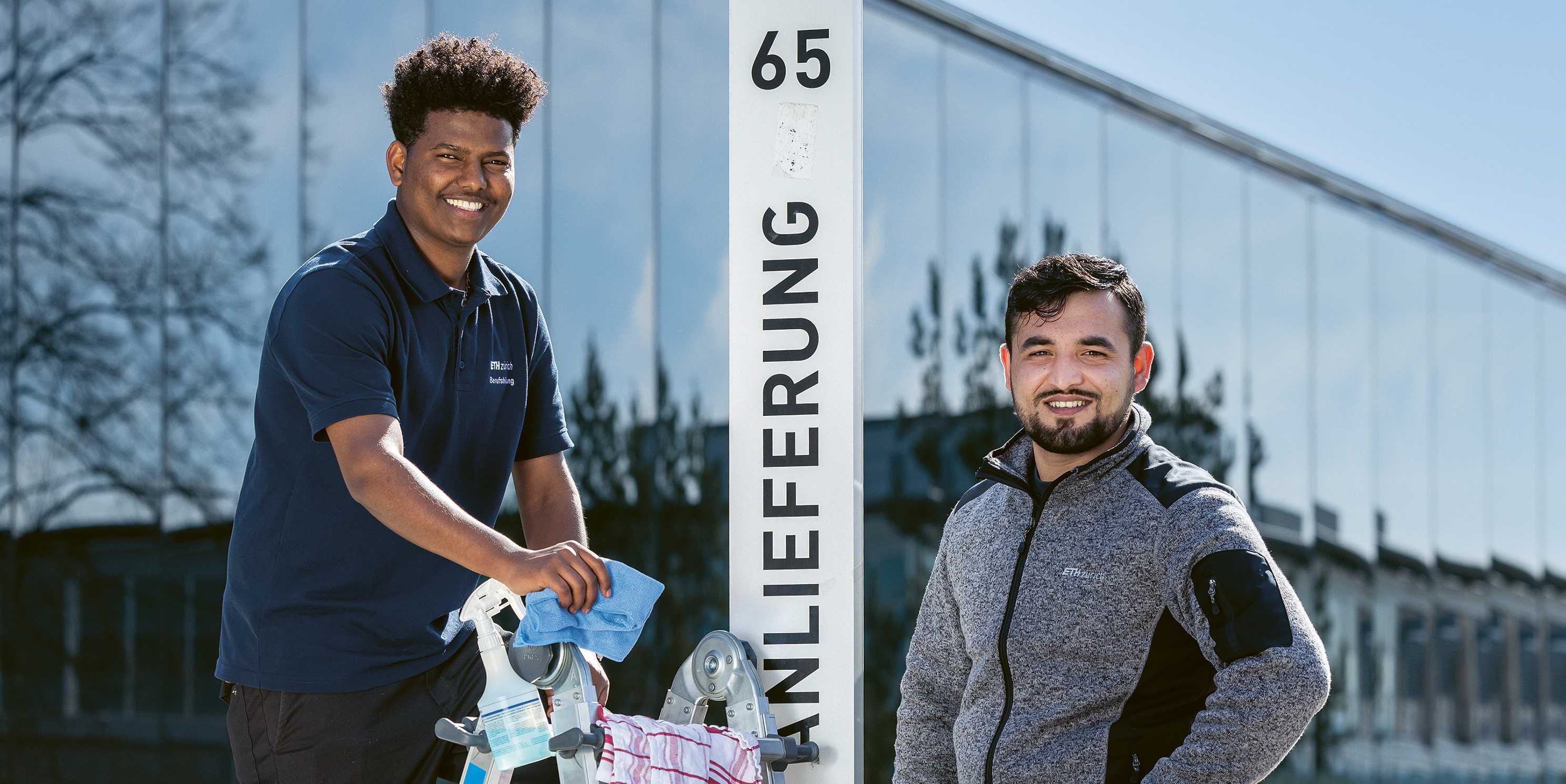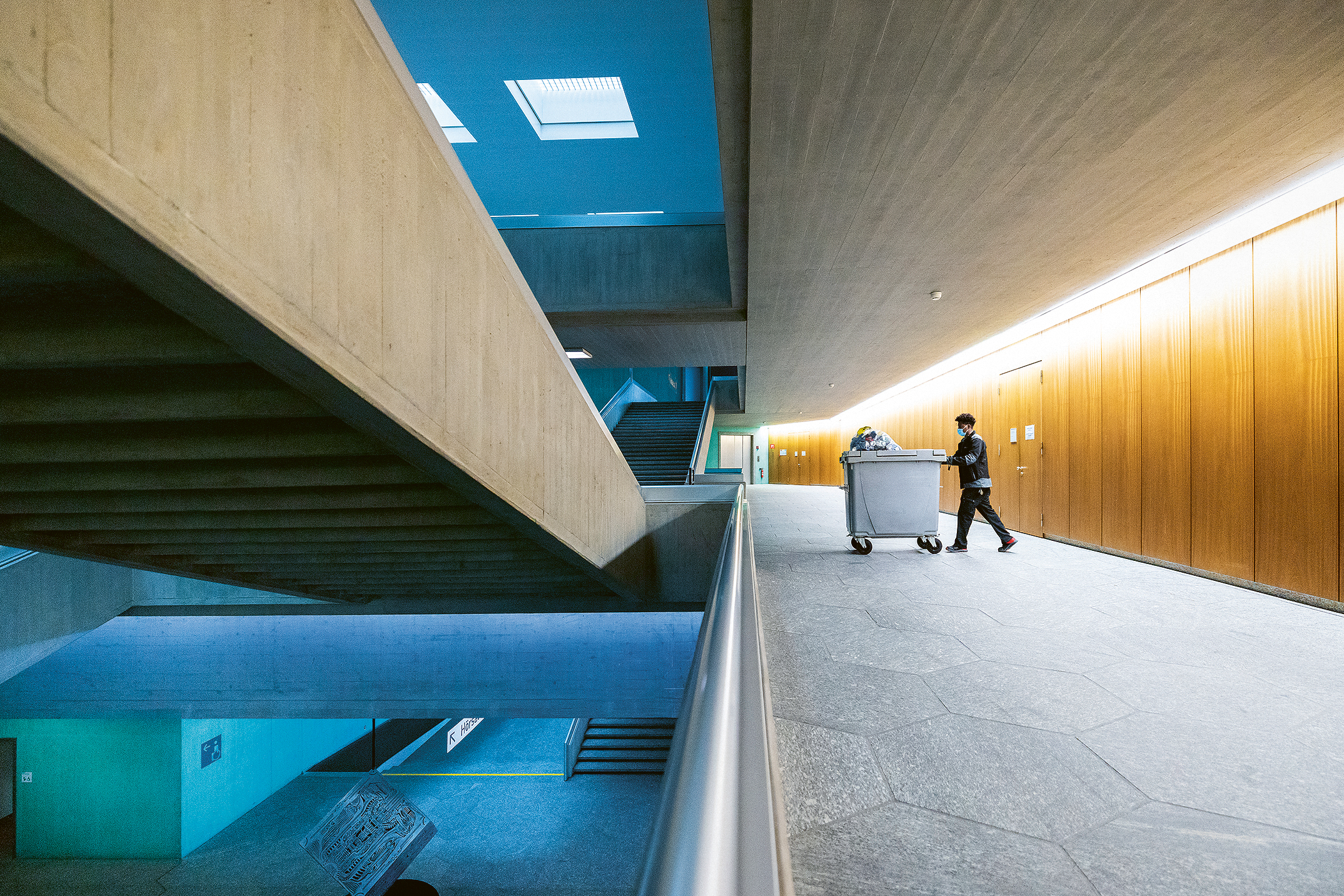
An opportunity for refugees – and for ETH
ETH Zurich started offering pre-apprenticeships for refugees last August. How are things going for the first two participants in the programme? And what are the next steps for the pilot project?
Raihan Dargai spent four months in a Bulgarian prison. The 22-year-old recalls that, alongside the lack of food, it was the condescending attitude of the guards that bothered him the most. He wasn’t in prison because he had committed a crime. As the Taliban gained increasing power in his home country, life became increasingly dangerous for the young Afghan. Six years ago, he decided to flee, which resulted in his being imprisoned through no fault of his own. It was a year and a half in total before Raihan arrived at the asylum centre in St. Gallen.
He now lives in Zurich, and last August started a pre-apprenticeship in operational maintenance at ETH. “I like doing installation work the most,” says Raihan as he carefully sweeps up some wall plaster that has fallen on the floor. He has just finished mounting a paper towel holder on the wall of the new workshop in the Octavo building. Raihan is quiet, very polite and attentive and, given the short amount of time he has spent in Switzerland, speaks German extremely well. It is a sunny Monday morning in the middle of March. Today he has already repaired a door upstairs, replaced a light bulb in the stairwell and removed coffee stains from a carpet. He works in Facility Services three days a week and attends vocational school the other two.

The Swiss government started offering the pre-apprenticeship programme in various cantons in 2018 with the aim of promoting the integration of recognized refugees and temporarily admitted persons. Each year, between 800 and 1,000 refugees complete the preliminary yearlong course in order to acquire specific practical skills in preparation for an ap - prenticeship in Switzerland. Depending on requirements and the assessment provided by the school and trainers, participants can complete a normal apprenticeship at the same establishment or apply to a different organisation. Last year 60% of participants went on to start a real apprenticeship.
Gaining new specialists
The pre-apprenticeship programme was initiated at ETH by Head of Vocational Education and Training Fabienne Jaquet, and a pilot project was launched last summer. To start the programme off, two places were offered in operational maintenance. “We want to make a tangible contribution to inclusion and equal opportunities, both of which are part of ETH’s strategic goals,” explains Fabienne, who was keen to introduce the programme as quickly as possible.
There are advantages for everyone involved: “We are increasing diversity in the workforce, improving our intercultural skills and gaining prospective specialists who are highly motivated and identify strongly with ETH because they are very grateful for this opportunity,” says Fabienne. “Without this programme, we probably wouldn’t have been able to employ them because their language skills, for example, might not be good enough for a normal apprenticeship.”
“Starting in August, ETH will be one of the first organisations in Switzerland to offer a pre-apprenticeship culiminating in the qualification of IT specialist.”Fabienne Jaquet, Head of Vocational Education and Training
According to Raihan’s trainer, Islam Alija, however, language is a sticking point, even in the case of the pre-apprenticeship programme. Refugees can only apply if they have already successfully completed the relevant canton’s Potentialabklärung (assessment of potential), which involves demonstrating A2-level German proficiency. In Islam’s experience though, participants still need a lot of support with administrative tasks, particularly at the beginning, and it can take a long time to explain things. In his opinion, it would therefore be beneficial if there was even more of a focus on language at the preliminary assessment stage and if the apprentices could attend additional German lessons during the programme.
Three new pre-apprenticeship
This is confirmed by Fuat Veselji, who is training Tuemfal Weldegabriel, the second participant in the pilot programme. The 23-year-old Eritrean is taking part in the pre-apprenticeship programme on the Hönggerberg campus. He arrived in Switzerland seven years ago. The first three years in the asylum seeker hostel were tough, he says. But things are going well now. “I can’t say which part of the work I like the most because I enjoy it all,” Tuemfal explains as he pushes a large grey rubbish container through the underground passages to the disposal point. His work includes cleaning and disposal as well as repairs, painting work and sanitation tasks.
According to Fuat, the whole team needs to work together for the pre-apprenticeship programme to succeed. There is extra work involved for everyone at the start, because participants need to learn about a whole range of cultural practices, including decision-making processes and hierarchies. But ultimately, the whole team benefits. “It really makes me happy to see the progress that Tuemfal is making and I wouldn’t hesitate to get involved in the programme again,” he says.

It has not yet been decided whether a pre-apprenticeship will be offered again this summer in Facility Services. “What is certain, however, is that starting in August, ETH will be one of the first organisations in Switzerland to offer a pre-apprenticeship culminating in the qualification of IT specialist in our IT Services department,” says Fabienne, adding: “The young Iranian who got the place was already able to carry out programming independently on his taster day.” Starting this summer, there will also be a pre-apprenticeship in logistics culminating in the qualification of logistics specialist in Campus Services, and another place for a commercial apprentice will be offered from August 2023 onwards.
ETH is currently looking into whether the programme can be expanded more rapidly due to the war in Ukraine. “We are working to create additional pre-apprenticeship places as quickly as possible,” says Fabienne. Interested departments can contact Fabienne at any time.
Overcoming prejudices
Overall, everyone involved in the programme up to now is confident that it is making an important contribution to integration in the field of employment. According to Islam, it is also helping to overcome prejudices. “When you hear about this programme, you imagine having to explain every little thing to the refugees and you think it will take a long time for them to get integrated.” But that couldn’t be further from the truth: “Right from the beginning, in terms of his maturity, independence and manual skills, Raihan was much more advanced than the regular apprentices, who are usually still teenagers.” He only had to be shown how to do something once and he picked it up straight away. He was also integrated into the team incredibly quickly and is held in high regard by all his colleagues. “There was never any need for additional integration work,” says Islam.
Raihan’s life outside ETH is also very similar to the lives of Swiss people his own age: He shares a flat with two people from Switzerland and one from France, goes to cricket practice every Friday evening and enjoys meeting up with his friends.
On this particular Monday, he has arranged to meet Tuemfal for lunch on the Hönggerberg campus. The two men got to know each other in the German classes they took prior to the pre-apprenticeship programme. Tuemfal leads him straight to his favourite canteen – it is clear that the 23-year-old has no problems finding his way around campus. “They know what I’m going to order as soon as they see me,” Tuemfal says proudly as they join the queue at Rice Up.
“Language is the key”
Raihan already knows that he will be able to stay at ETH after completing his preapprenticeship. In August he embarks on a three-year apprenticeship as a maintenance technician with a Federal VET Diploma (EFZ). Whether Tuemfal stays at ETH is not yet clear. Although he has received positive feedback from the school and from within ETH, his German is not yet at a sufficiently proficient level for the Federal VET Diploma, and ETH currently does not offer a two-year apprenticeship in operational maintenance leading to a Federal VET Certificate.
Tuemfal says that learning a new language from scratch is really hard for him. “In Eritrea I was a real man. Now I have to start all over again and I often feel like a little kid.” It’s not easy. “But you have to learn German!” says Raihan. “Language is the key, brother.”
And as the two of them eat their chicken dishes in the Albert-Steiner-Garden, surrounded by other ETH members, it becomes clear that there is another important thing that differentiates them from their Swiss colleagues: “The hardest thing is not being able to see your family,” they both agree. They have only been in contact with their loved ones every few months, and the nature of their residence permit (for temporarily admitted foreigners) means that they are not allowed to leave Switzerland.
Despite this, however, they have never regretted their decision to flee. “In Afghanistan, I would never have had the safety, the freedom and the education opportunities I have here,” says Raihan. “In my home country, a career as a caretaker isn’t an option. But after the last six months, I know for sure that it’s my dream job.”
This article appeared in the current ETH magazine "life".
Departments that would like to introduce a pre-apprenticeship programme can contact fabienne.jaquet@hr.ethz.ch at any time.

Comments
No comments yet